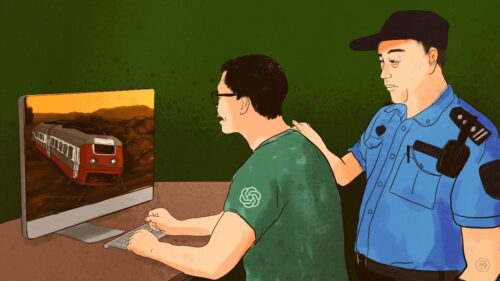Chinese TV cartoon characters censored for ‘dyed’ hair
The complaint that landed the show in trouble was made by an anonymous viewer on May 22. In a note submitted to content regulators in Hunan, the viewer said the series had “problematic” values, and that the main characters set a bad example for kids because they “dyed their hair bright colors,” “wore loud clothes,” and “did costume changes onstage.”

This week, the media watchdog in Hunan Province ordered (in Chinese) a local television network to take a cartoon series off the air because of its negative influence on children. The move came after a complaint from a viewer, who took issue with how the cartoon’s characters dressed themselves.
The show in question is Shining Star (菲梦少女 fēimèng shǎonǚ), which premiered on the Golden Eagle cartoon channel in May and has since been on-air almost every day since then. It’s the Chinese version of a South Korean animated series that focuses on three girls who form a female idol group (pop band) and overcome a series of challenges on the path to success.
The complaint that landed the show in trouble was made by an anonymous viewer on May 22. In a note submitted to content regulators in Hunan, the viewer said the series had “problematic” values, and that the main characters set a bad example for kids because they “dyed their hair bright colors,” “wore loud clothes,” and “did costume changes onstage.”
On June 10, Hunan’s Radio and Television Bureau responded to the complaint, saying that while the show was designed to “spread positive energy” by telling the story of a group of girls pursuing their dreams, its creators made some mistakes in execution. “The production company gave bold hair colors to different characters to make them more distinguishable. It didn’t intend to encourage children to dye their hair,” the bureau wrote. “But they failed to pay enough attention to details and forget how much subtle influence the show would have on children.”
The bureau also said it had ordered the cartoon channel to stop broadcasting the series and to create more “high-quality content” beneficial to the mental growth of kids and teenagers. “Going forward, we will continue urging the Golden Eagle cartoon channel to fulfill its social responsibilities and be careful about the values it endorses,” reads the response.
On Chinese social media, a large number of people criticized the bureau’s decision to take down the show, with the most prevalent argument being that the order was an overreaction. “It baffles me how ignorant someone would have to be to lodge a complaint like that and how stupid the officials would have to be to think they need to take action about it,” a Weibo user wrote (in Chinese).
Some Weibo users also argued that this “farce” was the latest instance of people abusing online complaint systems owned by local governments to “vent about minor issues bothering them” or “impose their ultra-conservative values on others.” “Reporting something to authorities feels like a joke now. Not everything that gets reported on needs to be punished. Given how officials dealt with complaints lately, reporting should be renamed summary judgment,” a Weibo user wrote (in Chinese).






